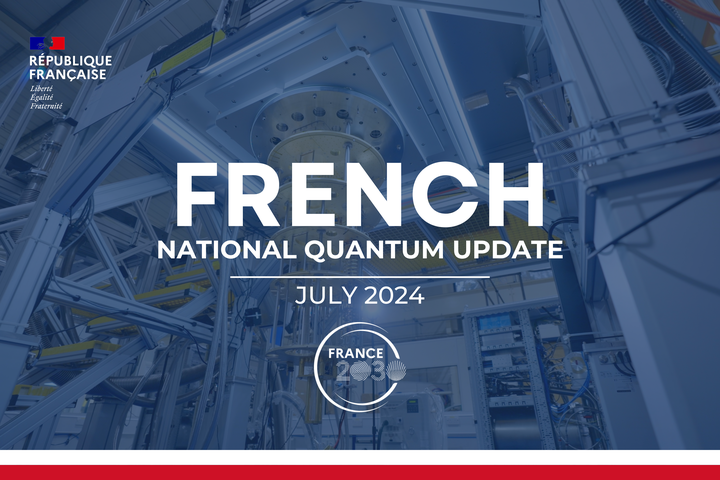French National Quantum Update – July 2024

Executive Summary
The French quantum industry wins the medal count for quantum ecosystem this month – sprinting into collaborations within the country and hurdling obstacles to cement ties with partners in Europe and beyond. In a mega-merger, EDF, Quandela, Alice & Bob, and the French National Centre for Scientific Research (CNRS), have signed an agreement to collaborate on exploring use cases in the electrical utility industry. It is often difficult – and possibly unimportant – to distinguish between research advances and use case opportunities. This month, Qubit Pharmaceutics and Sorbonne University demonstrated the ability to reduce the number of qubits needed to simulate molecules – which could pave the way for several use cases in the life sciences. Ultimately, the month of July, in the microcosm, is showing that the interest and commitment to build a strong French quantum ecosystem is paying off – it is growing across the nation, around the globe and among the scientific disciplines and commercial sectors. Here is a partial list of notable news stories that circulated about members of the French quantum community in July 2024.
Policy
NSTC delegation tours Finland, France to expand quantum technology cooperation
A delegation organized by Taiwan’s National Science and Technology Council visited Finland and France in late June to seek expanded cooperation in quantum technology, the NSTC said July 3. Led by Luo Meng-fan, director-general of the NSTC’s Department of Natural Sciences and Sustainable Development, the group included officials and experts from the NSTC Quantum Program Office, Taiwan Semiconductor Research Institute and Industrial Technology Research Institute.
Business
“We Are Just Starting The Quantum Journey,” Says CTO At GENCI Stéphane Requena
In a recent interview at Pasqal Thoughts 2024, Stéphane Requena, CTO at GENCI (Grand Équipement National de Calcul Intensif), discussed the pioneering collaboration between Pasqal’s Quantum Processing Units (QPU) and the CEA’s High-Performance Computing (HPC) resources. This initiative is set to revolutionize the future of computing by integrating quantum capabilities with existing HPC infrastructure.
Alice & Bob, Quandela And CNRS Partner To Optimise Energy Efficiency Of Quantum Computers
The French electric utility company EDF, along with quantum computing companies Quandela and Alice & Bob, and the French National Centre for Scientific Research (CNRS), have signed an agreement to collaborate on an innovative project to optimize energy consumption in quantum computing.
Quandela, the European leader in photonic quantum computing, and Welinq, a leading quantum networking company, proudly announce a transformative partnership for the quantum industry. This collaboration combines Quandela’s expertise in photonic quantum computing with Welinq’s pioneering full-stack quantum interconnects technology to provide custom quantum links for photonic quantum computers, setting new industry standards and paving the way for clusters of interconnected and error-corrected photonic quantum computers.
Quantonation, the leading early-stage investment fund dedicated to quantum technologies, is pleased to announce an investment through its fund Quantonation II in Pioniq Technologies, a Paris-based ESPCI and CNRS spin-off.
Toshiba Corporation (Toshiba) has announced that it will make a corporate venture capital investment in Quantonation II, a fund operated by Quantonation Ventures (Quantonation), a leading quantum technology investment fund based in Europe and the US. Toshiba has committed to invest in Quantonation II, with the aim of accelerating research and development of quantum technology and advancing the practical application of quantum-based services through collaboration with Quantonation and the companies in its portfolio.
Research
A 2D Device May Help Quantum Computers Stay Cool
To perform quantum computations, quantum bits (qubits) must be cooled down to temperatures in the millikelvin range (close to -273 Celsius), to slow down atomic motion and minimize noise. However, the electronics used to manage these quantum circuits generate heat, which is difficult to remove at such low temperatures. Most current technologies must therefore separate quantum circuits from their electronic components, causing noise and inefficiencies that hinder the realization of larger quantum systems beyond the lab.
Qubit Pharmaceuticals, a deeptech company specializing in the discovery of new drug candidates through molecular simulation and modeling accelerated by hybrid HPC and quantum computing, announces that it has drastically reduced the number of qubits needed to compute the properties of small molecules with its Hyperion-1 emulator, developed in partnership with Sorbonne University. This world first raises hopes of a near-term practical application of hybrid HPC – quantum computing to drug discovery.
CNRS dominates quantum computing publications in Europe
In the race to unlock the promise of quantum computing and spark a revolution in computer science, the French National Research Council (CNRS) has taken the lead in Europe when it comes to published papers, a Science|Business analysis of the Scopus database of peer reviewed literature shows.
Education and Events
Eviden, the Atos Group business leading in digital, cloud, big data and security, today announced it is supporting the University of Reims Champagne-Ardenne (URCA) through training initiatives to raise awareness of the challenges of quantum computing. URCA will draw on Eviden’s long-standing expertise in the sector, through its Qaptiva offering.
Seminars in Quantum Information and Computation
LaBris is a research group in quantum computing, formally created in 2024 and located in Bordeaux (France). Our members are hosted at LaBRI in Université de Bordeaux. We are also part of the CNRS research networks in quantum information (GT IQ) and in quantum technologies (GDR TeQ).
